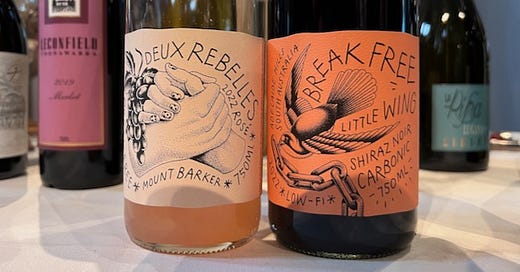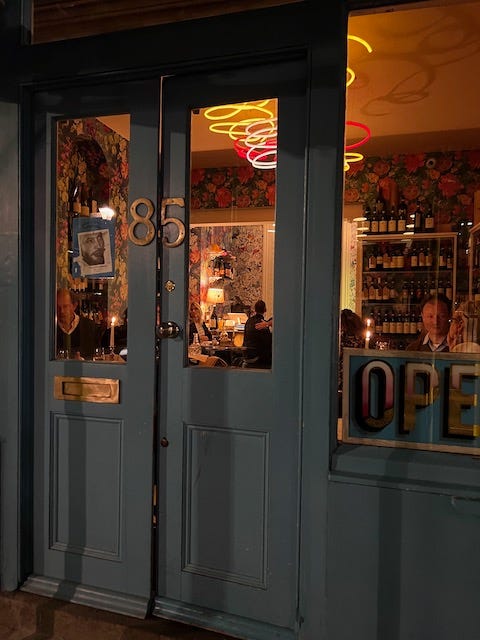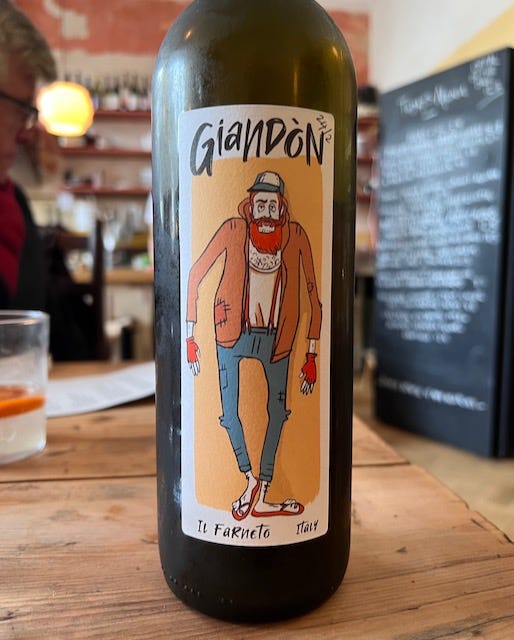I haven’t had a dislikes-and-how-you-can-overcome-them post for a while so I thought I’d tackle one that is constantly cropping up: natural wine.
For a number of friends it’s an absolute no no. they don’t like it and resent being made to drink it at restaurants who don’t have anything else in the way of wine to offer. (That I can sympathise with. There is usually something in a restaurant that you can eat. There should be something most people can happily drink.)
So what IS natural wine?
The very term rouses hackles, the implication being, critics say, that conventionally made wines are somehow unnatural and therefore inferior. ‘Low intervention’, a common alternative, isn’t much more helpful. All wines are made with human intervention so it’s a question of degree but so far as natural wine is concerned it basically comes down to how many additives are used in the winemaking process. If you don’t like additives in your food it should appeal.
When people talk about natural wine they’re not talking so much about what goes on in the vineyard as the winery. Many wines these days have organic certification, and quite a few are biodynamic made from vines that are tended and treated following the biodynamic calendar (a whole other subject) but the point is that doesn’t make them natural - though they often are.
Natural wines are generally made with wild or indigenous yeasts and lower levels of sulphur, may well be unfined and unfiltered and are quite often unoaked. Purists tend to feel that oak disguises a wine’s natural flavour
Sulphur or the relatively low level of it during the natural winemaking process is the biggest influence. It can lead to whites that taste cidery (a frequent criticism) although they may just be not very well made. Which you can say of conventionally made wines too but it’s obviously more galling when you’re paying over £20 for them as is often the case with natural wines. In their defence they frequently come from small artisan producers working by hand with low-yielding vines.
The best way to find out about natural wine - as indeed with other wines - is to take the opportunity to try them when they’re available by the glass. Here’s how to go about it
4 baby steps into natural wine
1. Focus on reds, particularly light gluggable ‘glou glou’ reds (I love that term! As I do the other French term vin de soif, which means a quaffable wine). Gamay - the grape that is used to make Beaujolais - is particularly well suited to this style.
2. Try a pet nat or pétillant naturel - that’s a semi-sparkling wine that’s bottled during its first fermentation rather than the secondary fermentation employed in the champagne method. (There’s a more detailed explanation here. Basically they’re younger, fresher and not quite as fizzy as champagne. Pet nat rosés are particularly delicious
3. Ask for a fresh white. This is trickier. White wines, as I’ve indicated, are more difficult to make because they typically contain higher levels of sulphur so go for younger, less expensive wines which tend to taste more like conventional whites. The widely available Ciello Bianco is a good example.
4 Try an orange wine, particularly with food (they’re great with middle-eastern food especially lamb, aubergines and walnuts. See my longer list here) Aromatic varieties such as malvasia and pinot gris are particularly delicious, tasting of peach and quince. Here’s one I tried recently with braised cuttlefish and artichokes)
It would be helpful if wine shops and restaurants would operate some kind of labelling system. One of the first natural wine bars, Terroirs, used to have a ‘wild horse’ symbol for wines that were more challenging.
I used to operate a traffic lights system when I had a natural wine blog - Green for wines you’d be hard pushed to tell from conventional wines, amber for wines which would probably taste unfamiliar but shouldn’t come as too much of a shock and red for wines that might be off-putting if you weren’t a natural wine aficionado.
In the absence of any guidance on the wine list just be upfront and make your preferences clear. As in “I’m not that into/familiar with natural wine so can you suggest something fresh rather than funky?”
Natural wine is a lot less scary than it was 10 years ago - the problem is it’s often a case of once bitten, twice shy. People make up their mind they don’t like natural wines yet they’re happy enough to persist with other food and drink they don’t at first like such as coffee, beer and olives.
I’m not speaking as a natural wine fanatic - I like well made examples of both natural and conventionally made wines - but I would urge you if you’ve had a natural wine you didn’t like not to write them all off. Keep an open mind and keep trying them!
By the way if you’re wondering what the wines in the top picture are they’re from Australia but not yet available in the UK so far as I can see but were shown at a tasting this week by Milestone Wines.
What do you think of natural wines. Are you a fan or a sceptic?







Good stuff, Fionna!
I like your traffic light system. We have a section titled ‘Adventurous’ to signpost wines that are a bit off the wall so that people don’t buy them unawares.
I wouldn't say natural wine is an absolute no-no for me - I had an absolutely killer GSM blend at Quality Chop House that turned out to be natty, and The Donkey and the Goat in California makes a lovely slightly sweet fizzy Chardonnay that I like very much. But my hit rate has been so low that I approach it with a certain amount of skepticism.
More than not being wild about natural wine self, I viscerally dislike the holier-than-thou vibe of many of its adherents. It's like going into a coffee shop that won't put out sugar, or meeting an so-called chocolate aficionado who won't touch anything that's lower than 70% cacao.